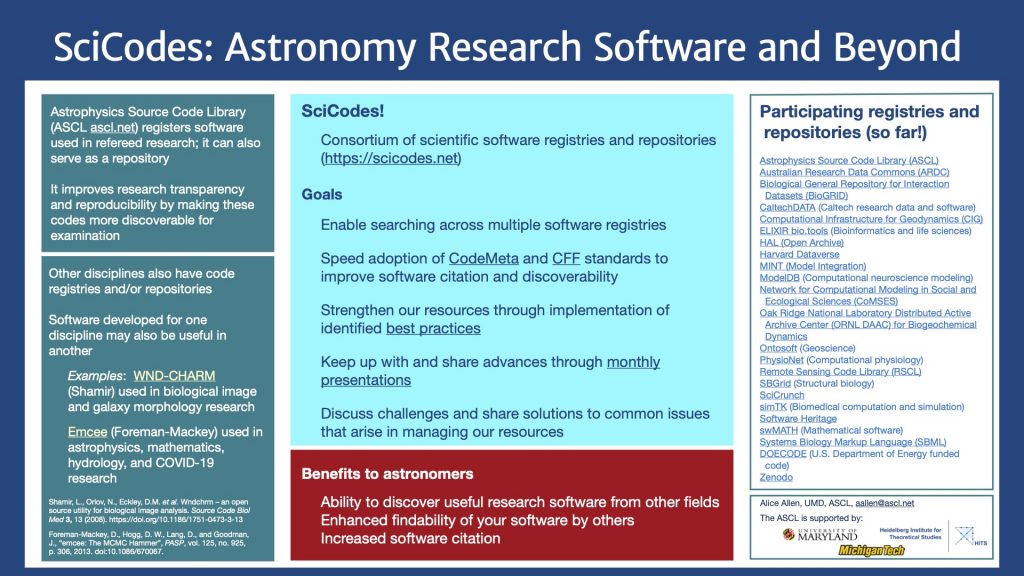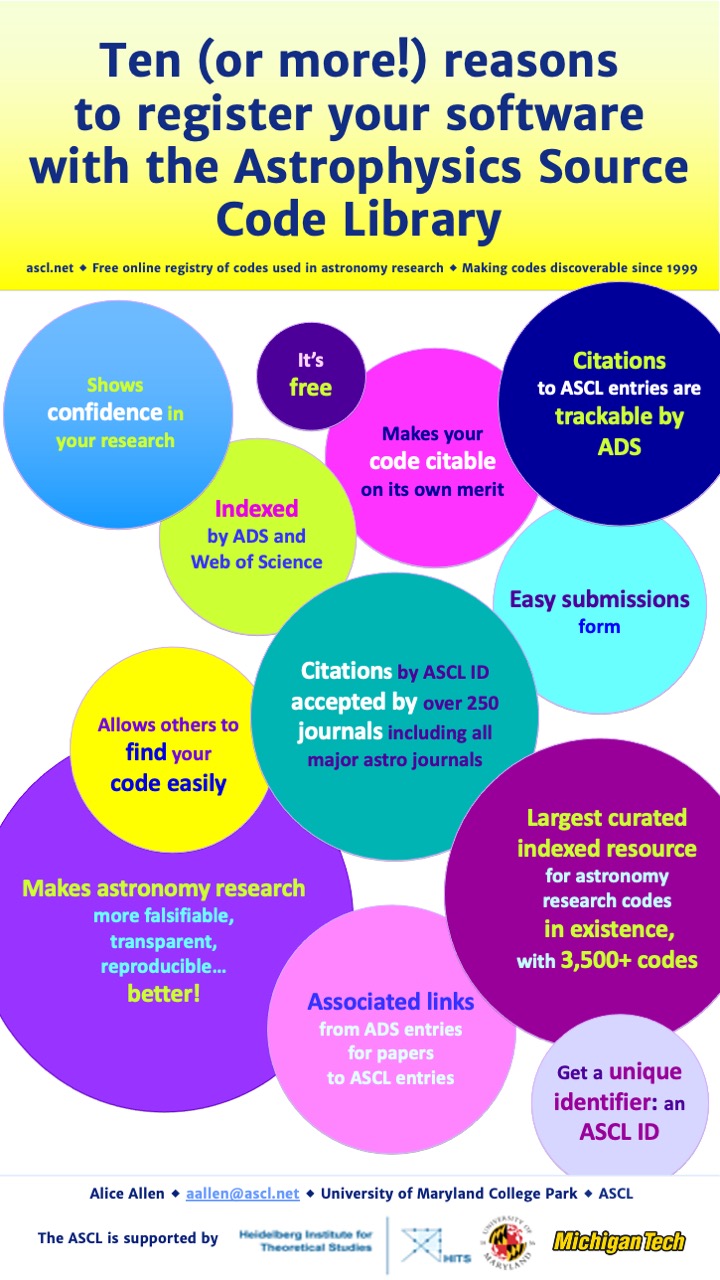
This presentation covers the benefits of registering astronomy research software with the Astrophysics Source Code Library (ASCL, ascl.net), a free online registry for software used in astronomy research. Indexed by ADS and Clarivate’s Web of Science, the ASCL currently contains over 3500 codes, and its entries have been cited over 17,000 times. Registering your code with the ASCL is easy with our online submissions system. Making your software available for examination shows confidence in your research and makes your research more transparent, reproducible, and falsifiable. ASCL registration allows your software to be cited on its own merits and provides a citation that is trackable and accepted by all astronomy journals and journals such as Science and Nature. Adding your code to the ASCL also allows others to find your code more easily, as it can then be found not only in the ASCL itself, but also in ADS, Web of Science, and Google Scholar.
Category Archives: ADASS
ASCL at ADASS XXXIII: Broken bones and improving the visibility and citability of exoplanet research software
ADASS is my favorite conference; it’s so favored that… well, you’ll see …
ADASS was in Tucson this year. I decided to drive from Maryland to Tucson, figuring that was likely my best way to avoid getting/bringing COVID to the conference. It’s too long a drive to do in one day, so I stayed at a campsite outside Claremore, Oklahoma one night. It was lovely! Almost deserted, lots of birds, view of the lake… perfect! But alas, when making my coffee the next morning, I tripped and fell, breaking my right arm and nose and bashing up a few other body parts. I got patched up at a local hospital (excellent care!) and had surgery two days later (more excellent care!). I couldn’t drive, of course, so what to do, what to do? A friend offered to fly to Tulsa and drive me wherever I wanted to go, suggesting “back home” would be best. Where did I want to go? Tucson, of course! I did not want to miss ADASS!! So off to Tucson we went. Once I was deposited in a hotel there, she flew back to her home. (Now that’s a friend!! I’m forever grateful!!)
I gave an oral presentation at ADASS on “Improving the visibility and citability of exoplanet research software,” this about the work the ASCL is doing with NASA’s Exoplanet Modeling and Analysis Center (EMAC) and ADS. Links to my slides and proceedings pre-print are below.
ADASS did not disappoint! I’m so glad I attended it, and also attended the IVOA meeting immediately after. Everyone was helpful and kind, as I knew they would be. I stayed in Tucson until cleared to drive, and then drove myself the 2300 miles home. Not the trip (hahahaha) I was expecting, but it was the trip that was.
ASCL poster on software citation at ADASS XXXII
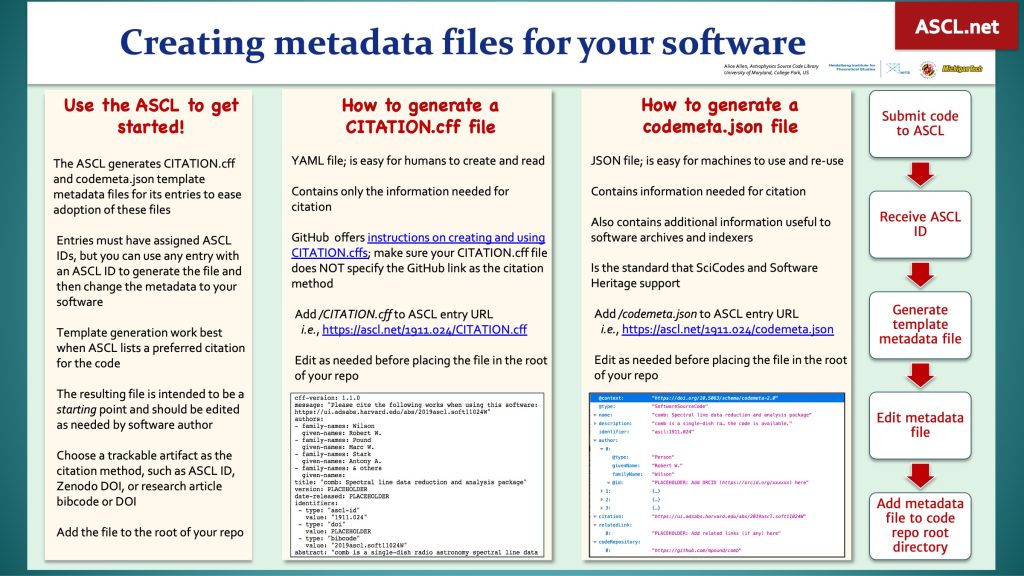
Are others using software you’ve written in their research and citing it as you want it to be cited? If not, this poster will help! Software can be cited in different ways, some good, and some not good at all for tracking and counting citations in indexers such as ADS and Google Scholar. Generally, indexers need to match citations to resources, such as journal articles, they ingest. There are several reasons why your code might not be cited well (in a trackable/countable way). One common reason is the lack of clear and explicit instructions on a code’s download site. Most astro code sites don’t list a preferred citation method! Make it easy for people to cite your software by listing a (good! trackable!) preferred citation method where others can easily find it. Creating a standard software metadata file, such as a CITATION.cff or codemeta.json, and adding it to the root of your code repo is easy to do with the ASCL’s metadata file creation overlay (see handout below), and will help out anyone wanting to give you credit for your computational method, whether it’s a huge carefully-written and tested package, or a short quick-and-dirty-but-oh-so-useful code.
#ADASSXXXI
Using the Astrophysics Source Code Library: Find, cite, download, parse, study, and submit
This morning, I gave a tutorial on the ASCL at ADASS XXXII, which is being held virtually from the University of Toronto and the University of Victoria. I’ll write more extensively about ADASS later this week; it is, as always, a fabulous conference with a lot of great work, talks, software, data, discussion, posters, chats, demos, tutorials… well, a lot! It’s my favorite astro conference.
But for now, slides from the tutorial and a link to the recording are below. Thanks to ADASS for accepting the proposal and to the participants for attending and for all the interesting (and occasionally scary!) comments and questions!
WE20211030: This week in the ASCL
The ADASS conference took place this week. The ASCL presented a poster about SciCodes at the conference. Though ADASS took up most of my time, eight new code entries, three of them submitted by their authors, were assigned ASCL IDs and moved into production. I also wrote and submitted an abstract for an iPoster presentation at the AAS’s January 2022 meeting.
ASCL poster on SciCodes consortium at ADASS XXXI
The Astrophysics Source Code Library (ASCL ascl.net), started in 1999, is a free open registry of software used in refereed astronomy research. Over the past few years, it has spearheaded an effort to form a consortium of scientific software registries and repositories. In 2019 and 2020, ASCL contacted editors and maintainers of academic discipline and institutional software registries and repositories in math, biology, neuroscience, geophysics, remote sensing, and other fields to develop a list of best practices for research software registries and repositories. At the completion of that project, performed as a Task Force for a FORCE11 working group, members decided to form SciCodes as an ongoing consortium. This poster will cover the consortium’s work so far, what it is currently working on, what it hopes to achieve for making scientific research software more discoverable across disciplines, and how the consortium can benefit astronomers.
Download poster (PDF)
#ADASSXXXI
ADASS Prize for an Outstanding Contribution to Astronomical Software
Awarded for the first time in 2020, the Astronomical Data Analysis Software and Systems (ADASS) Prize for an Outstanding Contribution to Astronomical Software is awarded every year at the annual conference. Eligible candidates are the developers of astronomical software ranging from those that have stood the test of time to those that are new and cutting edge. Depending on the software and the nomination, the award is given to either a group or an individual. Nominations can be for a single program, a package, or a library.
Nominations for this year’s ADASS Software Prize are due by midnight UTC on June 15th June 18. After that date, the Program Organizing Committee (POC) will review the nominations and descriptions and determine the winner. The winning software author, or a representative of the winning team, will be invited to give a talk at ADASS this year, have their ADASS conference fee waived, and receive a plaque.
Lightning talk at ADASS XXX: Making organizational software easier to find
The excellent ADASS XXX conference concluded yesterday. 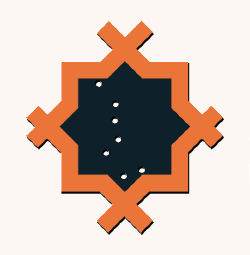 I missed meeting ADASS attendees face-to-face, but was delighted to spend time with them safely online, to learn about their projects and research, to talk about software and data, to share what the ASCL has been doing, and to meet old and new friends. The all-virtual conference was just about perfect; the technology set-up was excellent, providing opportunities to see sessions as they happened or at a later time on video, ask questions, comment on and discuss what was presented, and have one-on-one or small group video calls. The schedule was easy to keep track of, as one could subscribe to the schedule and get updates to it (mostly additions) immediately. Support was extremely responsive; an online Help Desk provided answers to queries almost immediately. There was even a conference photo!
I missed meeting ADASS attendees face-to-face, but was delighted to spend time with them safely online, to learn about their projects and research, to talk about software and data, to share what the ASCL has been doing, and to meet old and new friends. The all-virtual conference was just about perfect; the technology set-up was excellent, providing opportunities to see sessions as they happened or at a later time on video, ask questions, comment on and discuss what was presented, and have one-on-one or small group video calls. The schedule was easy to keep track of, as one could subscribe to the schedule and get updates to it (mostly additions) immediately. Support was extremely responsive; an online Help Desk provided answers to queries almost immediately. There was even a conference photo!
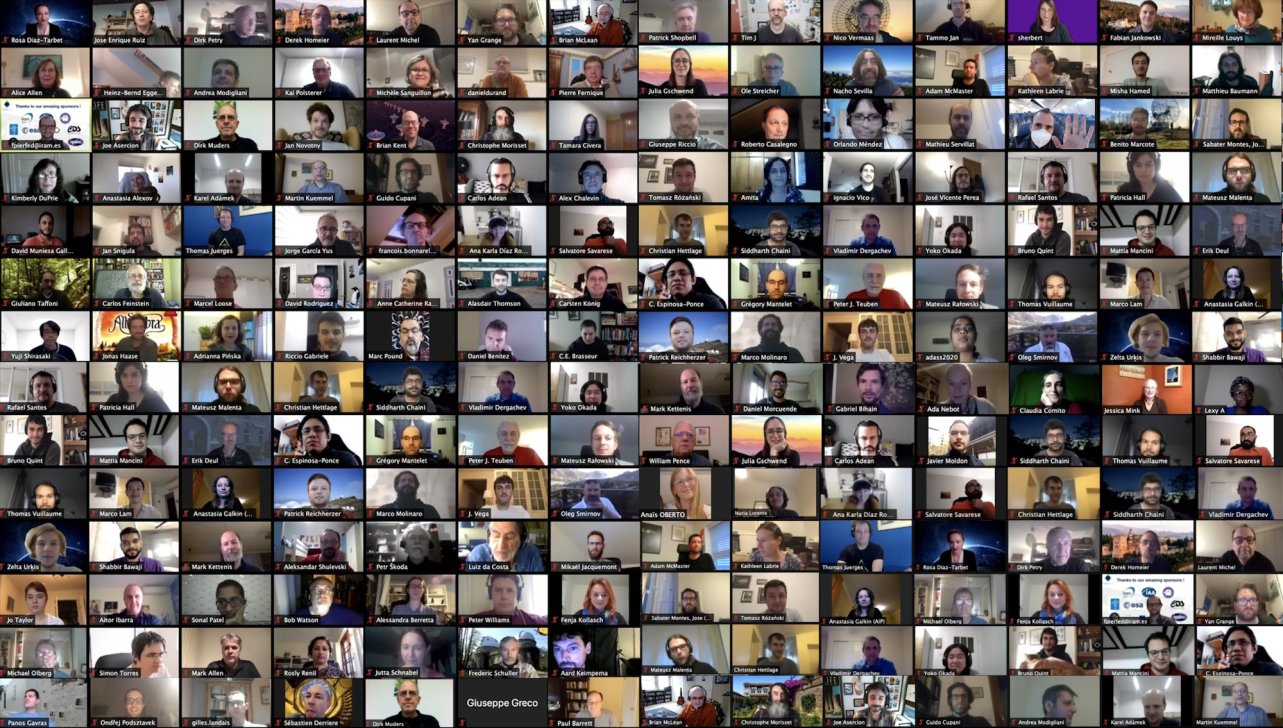
Poster presenters were invited to record and upload a lightning talk — no more than three minutes — for their posters; two-minute lightning talks via Zoom were also arranged at the conference. The ASCL presented a poster on Making organizational software easier to find in ASCL and ADS; the hastily-put-together lightning talk presented at the conference for this poster is below.
ADASS attendee Simón Torres offered to download all the pre-recorded lightning talks and stream them during the conference, so a Poster Video Watching Party was scheduled for Wednesday afternoon. The stream was great fun to watch! It was interesting, too, to see all the different ways people presented their lightning talks.
What a great conference this was! I look forward to next year’s!
ASCL poster on NASA software project at ADASS XXX
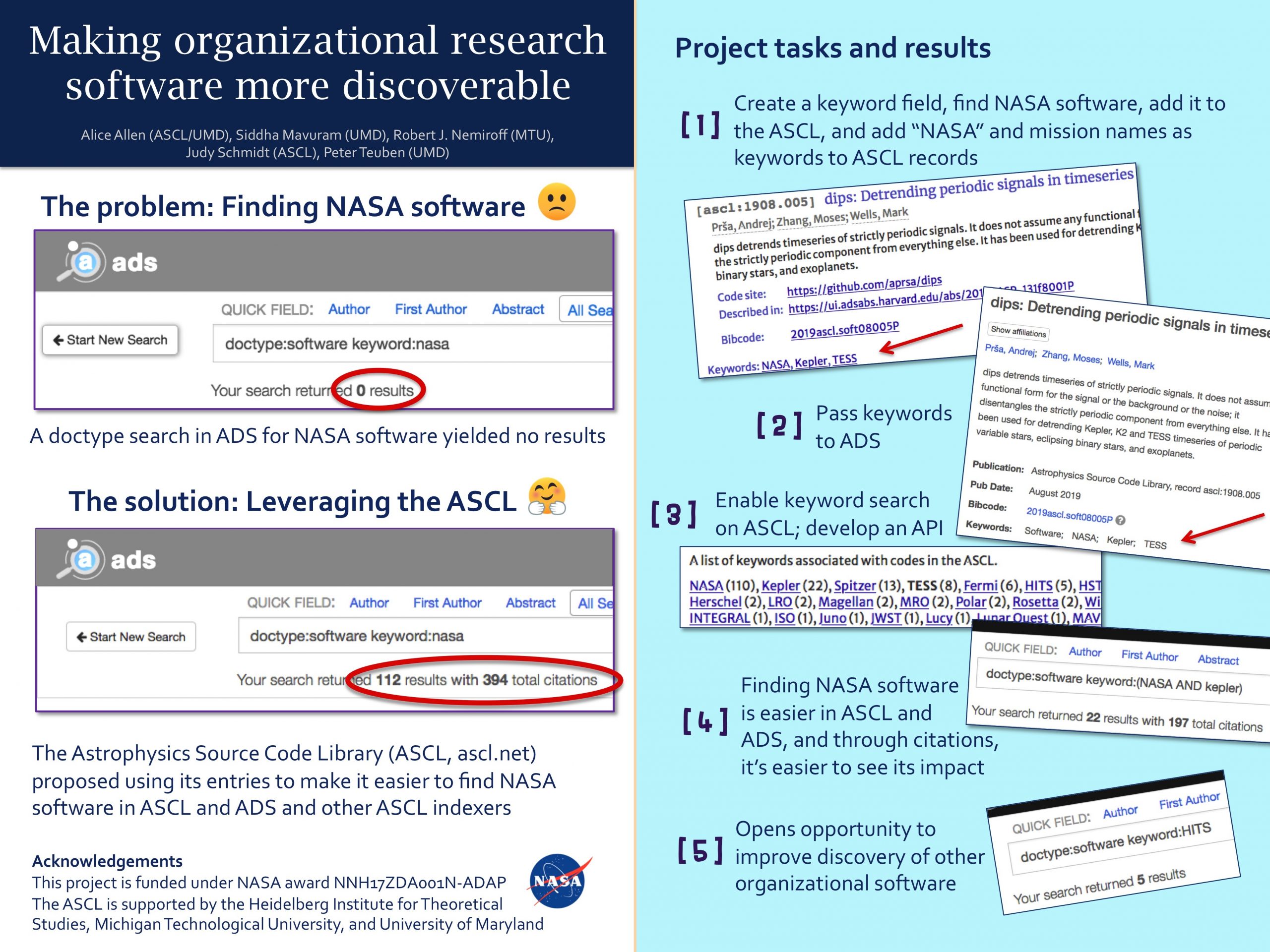
Software is the most used instrument in astronomy, and organizations such as NASA and the Heidelberg Institute for Theoretical Physics (HITS) fund, develop, and release research software. NASA, for example, has created sites such as code.nasa.gov and software.nasa.gov to share its software with the world, but how easy is it to see what NASA has? Until recently, searching NASA’s Astrophysics Data System (ADS) for NASA’s astronomy software has not been fruitful. Through its ADAP program, NASA has funded the Astrophysics Source Code Library (ASCL ascl.net) to improve the discoverability of these codes. Adding institutional tags to ASCL entries makes it easy to find this software not only in the ASCL but also in ADS and other services that index the ASCL. This poster presentation covers the changes the ASCL has made as a result of this funding and how you can use the results of this work to better find organizational software in ASCL and ADS.
ASCL API poster at ADASS XXX
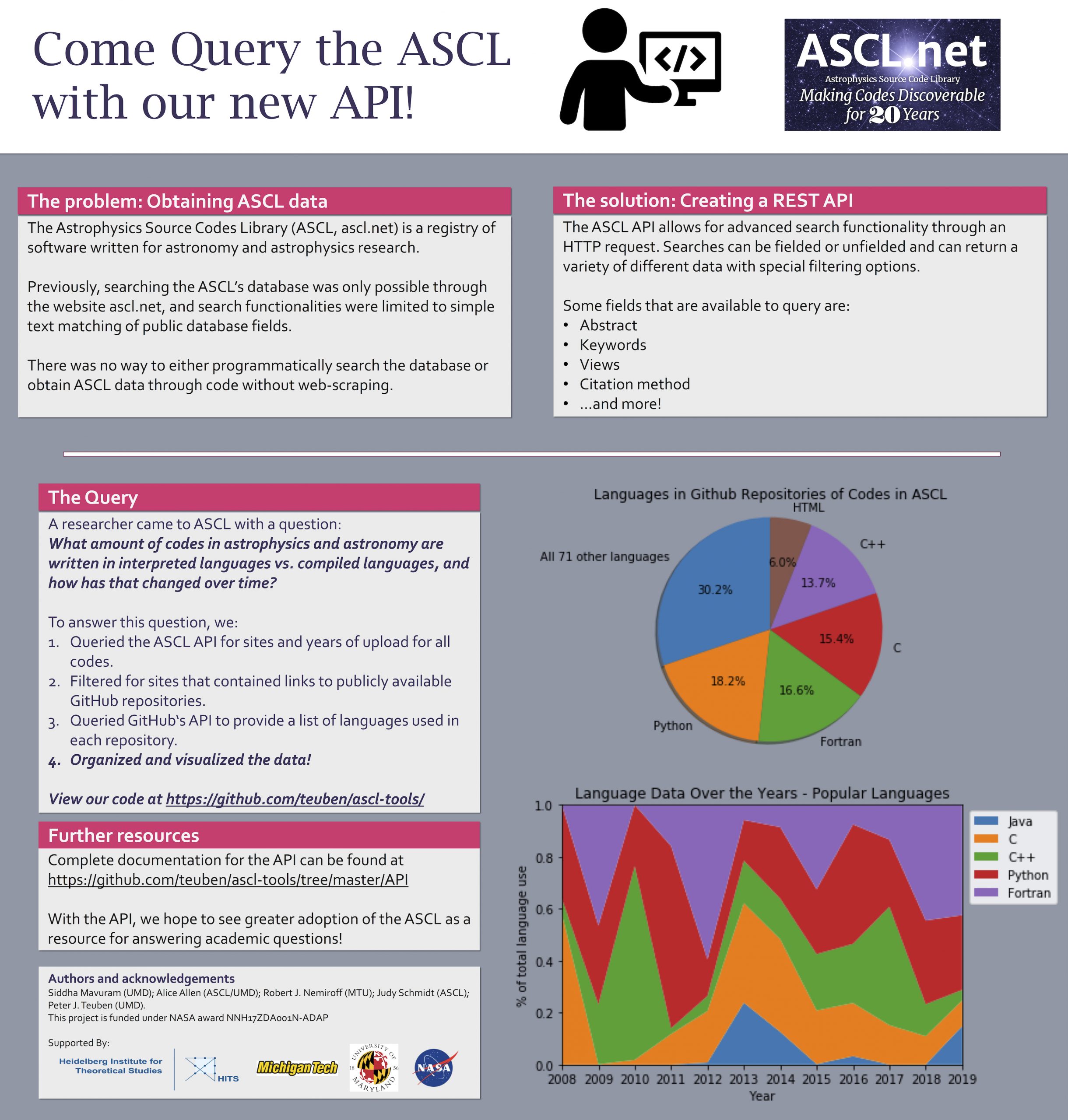
We have developed an API for the Astrophysics Source Code Library (ASCL) that enhances the ability of users to conduct complex and automated queries on ASCL indexed codes. The API is public and allows anyone to programmatically search and filter the ASCL software database via an HTTP request. For example, the search https://ascl.net/api/search/?q=%22supernova%22&fl=credit returns a list of authors with ASCL-indexed codes involving supernovae in JSON format. We will demonstrate the API and show its use in answering a researcher’s questions regarding the growth and usage of both interpreted and compiled languages in the database, gaining a more nuanced understanding of trends in astrophysics software development. Our findings confirmed a piece of conventional wisdom: that Python is growing in market share, while low level programming languages like C and C++ remain very popular. Further documentation for the API is available at https://github.com/teuben/ascl-tools/tree/master/API.
Siddha Mavuram (UMD), Alice Allen (ASCL/UMD), Robert J. Nemiroff (MTU), Judy Schmidt (ASCL), Peter J. Teuben (UMD)

